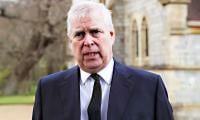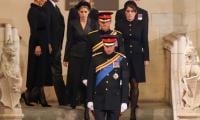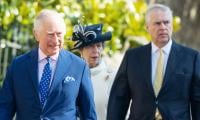Karachi Literature Festival ends on high note
The 14th Karachi Literature Festival ended on its third day on Sunday on a high note with a huge turnout of literature enthusiasts. The exciting line-up of sessions ensured that the attendees did not want to miss out engaging discussions. The festival provided a fitting finale to a celebration of literature, arts and culture.
Commenting on this year’s festival, Arshad Saeed Husain, managing director of the Oxford University Press (OUP) Pakistan that has been organising the annual event since its inception, said, “I am humbled and inspired by the overwhelming response we have received from our attendees. KLF is not just an event, but a movement that aims to spread the joy of reading and the light of learning across the country.”
He expressed gratitude to all the speakers, panellists, and performers, many of whom had arrived in Karachi from distant places, for being part of the festival. The final day of the festival commenced on an exciting note as cricket took to the stage as an opener of the day. The session captivated the audience as legendary cricketer Waseem Akram spoke along with Ali Khan, Ahmer Naqvi, and Hadeel Obaid.
Moderated by Nadeem Farooq Paracha, the session explored the intertwined relationship between cricket and Pakistan's national identity and political landscape. The session also saw the launch of two books — one of which was penned by Akram titled ‘Sultan’ and the other by Khan whose title was the same as the session, ‘Cricket in Pakistan: Nation, Identity and Politics’.
During the same time the Jasmine Hall was abuzz with intellectual stimulation as the distinguished panel session of ‘Faith and Intellect’ engaged in a riveting discussion moderated by Ghazi Salahuddin. The panel consisted of economists Kaiser Bengali, Syed Salim Raza and Syed Shabbar Zaidi who delved deep into the intersection of faith and reason as well as the role of intellect in religious practices.
As the day progressed, a number of sessions took place including ‘Untangling South Asia’, ‘Searching for Peace and Security Among Neighbours’ and ‘Evolving Geopolitics: Impact on Pakistan’ that saw interesting discussions on the complex dynamics of the region. These sessions delved into the issues of security, economic development and political stability, providing a nuanced understanding of the challenges facing Pakistan and the South Asian region.
One of the highlights of the day was a session titled ‘From Silver Screen to Mini Screen: Goldmine of OTT Media’ which featured Safinah Danish Elahi as the moderator conversing with Faseeh Bari Khan and Sanam Saeed. The panellists highlighted how digital streaming platforms especially OTT platforms had expanded the possibilities for content creators by providing more creative freedom and a wider audience reach.
The speakers also discussed the massive potential that Pakistan had for new forms of storytelling and the democratisation of the media industry through digital platforms.
Javed Jabbar and Shamim Ahmed, both prominent figures in Pakistan's political and intellectual landscape, participated in a talk titled ‘The Equitable Tax’. The conversation centered around issues related to tax reform and its potential impact on achieving economic equity and social justice.
In a session titled “Duusri Mulaqaat”, Anwar Maqsood and his wife Imrana Maqsood sat down for a conversation with Arts Council of Pakistan President Ahmed Shah.
The audience was thoroughly entertained and amused by their lively banter, which showcased Maqsood’s unique style of humour and storytelling.
The session ‘Saints, Sufis and Shrines: The Mystical Landscape of Sindh’ drew special attention from the crowd as it explored the rich history and significance of Sufism and its impact on the culture and society of Sindh. The panellists discussed the role of Sufi saints, their teachings and the significance of their shrines in Sindh.
As the evening drew nearer, a number of sessions took place involving renowned international intellectuals including Rassheedah Watts, Krisha Kops, Shehan Karunatilaka, Damon Galgut and Sinan Antoon.
A session titled ‘Pakistan's Economy: Depth and Resilience’ led by Samiullah Siddiqi and joined by Miftah Ismail, Akbar Zaidi, Muhammad Aurangzeb and Azfar Ahsan explored the challenges and opportunities in Pakistan's economy. It also highlighted the potential of sectors such as agriculture, industry and services in driving the economic growth and pulling the country out of its current predicament.
The panellists discussed the investment potential in Pakistan and asserted that with the right policies and incentives, Pakistan could become a highly attractive destination for foreign investment, creating opportunities for economic growth and job creation.
During the closing ceremony, Noori's electrifying performance left the crowd in awe as they made their way to the Main Garden. Ali Hamza and Ali Noor's memorable hits and high-energy stage presence kept the audience engaged and entertained.
-
 Christopher Nolan Reveals Why He's A Fan Of 'Fast & Furious' Movies
Christopher Nolan Reveals Why He's A Fan Of 'Fast & Furious' Movies -
 Ben Affleck Unable To Accept A New Lover Post Jennifer Lopez Divorce As He Still Grieves End Of Bennifer 2.0
Ben Affleck Unable To Accept A New Lover Post Jennifer Lopez Divorce As He Still Grieves End Of Bennifer 2.0 -
 Why Is Demi Moore Being Called Ozempic Victim?
Why Is Demi Moore Being Called Ozempic Victim? -
 Kaley Cuoco Makes Honest Comparison Of 'Big Bang Theory' And 'Charmed' Gigs
Kaley Cuoco Makes Honest Comparison Of 'Big Bang Theory' And 'Charmed' Gigs -
 Robert Picardo Shares Surprising Reaction On Returning To The 'Star Trek' Franchise
Robert Picardo Shares Surprising Reaction On Returning To The 'Star Trek' Franchise -
 AI Feud Deepens As Musk Targets OpenAI Over Safety Concerns
AI Feud Deepens As Musk Targets OpenAI Over Safety Concerns -
 'Paranoid' Andrew Fears Assassination: 'Panic Is Spiralling'
'Paranoid' Andrew Fears Assassination: 'Panic Is Spiralling' -
 Israeli Minister Hits Back At Prince Harry
Israeli Minister Hits Back At Prince Harry -
 Thousands Of Google Accounts Could Be Misused By Hackers: Report
Thousands Of Google Accounts Could Be Misused By Hackers: Report -
 Prince Harry Ignores Question About Andrew
Prince Harry Ignores Question About Andrew -
 Ryan Gosling On What Makes 'Star Wars: Starfighter' Different From Other Franchise Films
Ryan Gosling On What Makes 'Star Wars: Starfighter' Different From Other Franchise Films -
 Rumours About 'ambitious' Savannah Guthrie Dismissed
Rumours About 'ambitious' Savannah Guthrie Dismissed -
 Aly Michalka Reveals Why She Turned Down Offer To Star In 'Hannah Montana'
Aly Michalka Reveals Why She Turned Down Offer To Star In 'Hannah Montana' -
 Harry, Meghan Join William, Kate In Distancing Themselves From Beatrice, Eugenie
Harry, Meghan Join William, Kate In Distancing Themselves From Beatrice, Eugenie -
 'View' Co-host Sara Haines Makes Rare Confession About Married Life
'View' Co-host Sara Haines Makes Rare Confession About Married Life -
 Andrew Believes King Charles 'sacrificed' Him To Protect Institution?
Andrew Believes King Charles 'sacrificed' Him To Protect Institution?



